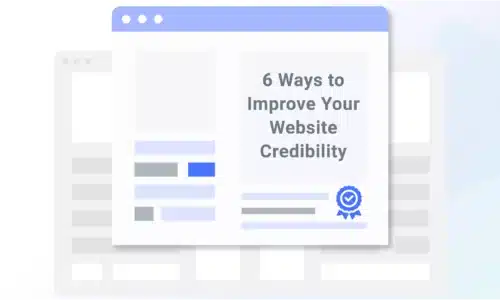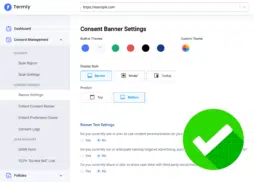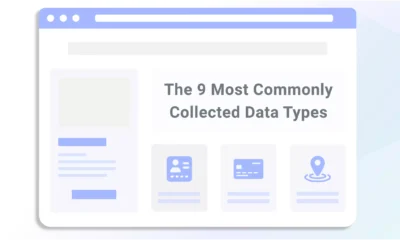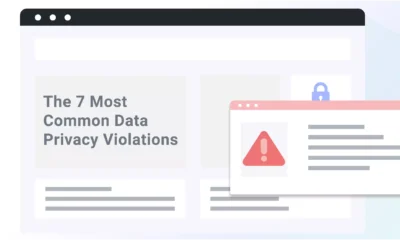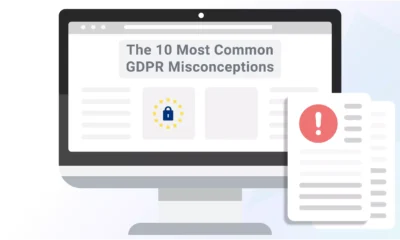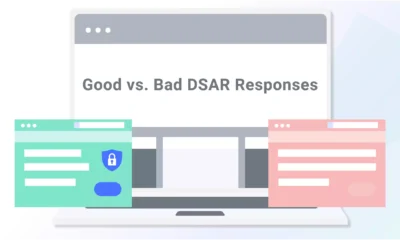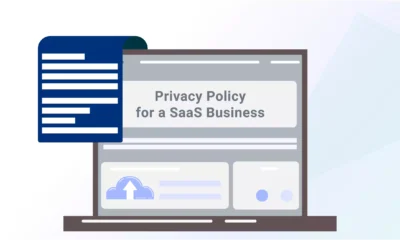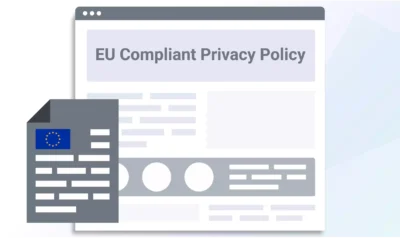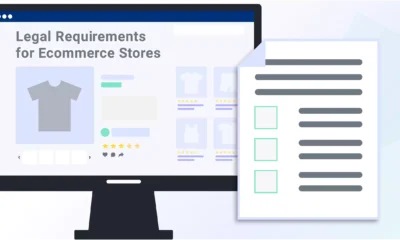It’s 2025 — no one is shopping on an insecure website.
Here are six easy ways to improve your website credibility and build customer trust, plus I’ve included actionable steps you can take right now.
Use a Comprehensive Data Privacy Solution, Like Termly
All credible websites should feature certain data privacy policies and consent solutions, including the following:
- Updated privacy policy
- Updated cookie policy
- A consent banner with adequate consent choices
- Easily accessible consent preference center
Why?
The privacy legal landscape constantly grows, evolves, and shifts in real time, impacting more businesses and consumers.
Laws like the General Data Protection Regulation (GDPR) or California Consumer Privacy Act (CCPA) may apply to your business depending on factors like:
- Where you’re located
- Where your consumers are located
- How much data you collect
- What kind of information you collect
- What you do with that data
If you fail to meet the legal requirements of these privacy laws, which includes informing consumers about what data you’re collecting and giving them adequate control over their data, you risk facing fines, legal penalties, and harming your brand’s reputation.
Data privacy statistics also show that consumer awareness over their privacy online is also increasing year after year, and we’re noticing a clear trend:
Consumers care about their personal information online and want more transparency and control.
Investing in a comprehensive data privacy solution can help your legal compliance efforts and gives your consumers a real choice over what happens to their personal data.
Actionable Steps To Build Credibility
Use a managed data privacy solution, like Termly, to add a privacy policy to your website and set up a cookie consent banner.
This can help your business more easily align with applicable privacy laws, so you don’t have to worry about the technical and coding aspects or the various legal nuances.
It also shows your website visitors that you respect their data and honor their privacy rights, which helps boost your credibility as an online business.
Build Trust and Social Proof
When establishing website credibility, it’s essential to focus on building trust and social proof by posting genuine, honest customer reviews on your website.
Why?
Highlighting reviews and testimonials from your actual customers can help an interested consumer finalize a purchase on your site.
This improves your conversion rates and boosts sales.
Giving people the chance to see customer opinions about your products helps earn their confidence.
As a result, people might feel more comfortable purchasing something from your website.
Actionable Steps To Build Credibility
You can encourage customers to leave reviews that you can feature on your website in several ways. For example, you might:
- Ask users to review you on sources like G2, Trustpilot, or social media platforms like Facebook;
- Sending a follow-up email after a consumer makes a purchase asking them to leave a review of the product, their experience, etc.;
- Include a form where users can freely submit reviews on your website.
You should also include disclaimers on your website informing visitors that you post customer testimonials and clearly state if you perform any affiliate marketing.
This is easy to do, aligns with consumer protection laws, and leads to building customer trust because you’re keeping them properly informed.
Perform Regular Updates and Security Maintenance
It’s important to perform regular updates and security maintenance on your website to ensure it’s safe from cyberattacks and other risks.
Why?
Maintaining your website security keeps your business safe and protects your customers.
The rate of cybercrimes is higher than ever, and bad actors target everyone, including businesses of all sizes, individual consumers, and even your employees.
We should all be more vigilant about security online.
When consumers see that your website takes cybersecurity seriously, it reassures them that your site is safe, and they’ll feel more comfortable following through on a purchase.
Actionable Steps To Build Credibility
There are a few best practices you can implement to help keep your website secure:
- Backup your site
- Use passwords and multi-factor authentication
- Use a secure, reliable host
- Use secure, reliable Plugins
- Limit user permissions
- Implement SSL/TLS Encryption
- Conduct regular security audits
You can also add a website maintenance clause to your terms and conditions so users know you are following through on these security updates.
Add Trust Seals and Certificates
Adding trust seals, relevant certificates, and other awards or accolades to your website can help enhance your credibility.
Why?
Posting relevant seals and certificates your business has earned shows consumers you’ve taken the time to follow through on the appropriate requirements to earn essential badges.
This shows visitors that your website is safe and your business is legitimate.
Actionable Steps To Build Credibility
Look for badges, certifications, and other accolades relevant to your industry, and add them to prominent places on your website, like the footer or landing pages.
You can also create blog posts or press-release-style content to highlight when you’ve earned a new certification and explain to your users what it means.
There may be specific badges or certifications depending on your industry.
For example, Termly is a Silver IAPP member, a Google CMP Partner with Gold status, and we’re compatible with the IAB TCF v2.2.
If you’re in the U.S., you might also consider becoming accredited with groups like the Better Business Bureau (BBB).
Be Honest About How You Use AI
If you want to build credibility, you must be honest about how your website uses AI and clearly inform users when they’re interacting with one.
Why?
AI technology is exciting, but according to various research about AI and data privacy, consumers are still wary about what it means for their personal information.
To ensure our use of this new technology is sustainable, lawful, and secure, we must be responsible and do our due diligence.
Fortunately, this is actually very easy; just keep these points in mind:
- Be Transparent: If you use AI for something on your website, be transparent and inform your consumers. Add clauses to applicable website policies, include disclaimers, and do whatever else is necessary to keep users informed.
- Respect Consumer Choices: Give consumers a chance to opt into or out of having their information shared with an AI — don’t force anyone to interact with an AI if they do not want to.
- Ensure You Can Follow Through on Privacy Rights: If your website is subject to following privacy laws, you must honor users’ privacy rights, including their right to have their data deleted or amended. This includes their data shared with any AI platforms.
Actional Steps To Build Credibility
Try resources like Termly’s Terms and Conditions Generator or Privacy Policy Generator to create clauses in your policies informing users about any AI platforms you use.
If you use AI in a way that processes personal information, you should include all details in your privacy policy, including:
- What AI platform or services you’re using
- If those services collect personal data from your website visitors or if you share their data with these platforms
- What categories of data are shared with these AI platforms
- What rights users have over their data
- How they can follow through on those rights
If necessary, you can even create a standalone AI policy.
How To Tell If Your AI Platforms Process Personal Data
Processing means any operation or sets of operations performed on personal data, both automated and not, and can include the following actions:
- Collecting
- Sharing
- Analyzing
- Recording
- Organizing
- Storing
- Using
- Erasing
- Deleting
If an AI platform you’re using does any of these actions to consumer personal information, then yes, your use of AI includes processing personal data.
Examples of when AI processes data can include any of the following:
- You input personal information about your consumers into an AI platform,
- You use an AI to analyze data sets containing personal information,
- You use AI to help monitor your users’ website activity.
Publish High-Quality Content
The content on your website is going to make the most significant impression on consumers — whatever you publish should be factual, high quality, and relevant.
Why?
What you post on your website will fully represent everything about your brand. It’s how you establish your mission, vision, and purpose.
Ensuring your content remains focused and relevant to whatever products or services you sell boosts your website’s credibility in the eyes of search engine algorithms.
For example, Google Chrome prioritizes E-E-A-T, or Experience, Expertise, Authoritativeness, and Trustworthiness, and Microsoft Bing focuses on Quality and Credibility or QC.
Actionable Steps To Build Credibility
Coming up with a successful content strategy is difficult but essential, so here are some tips to help you improve yours:
- Know your goals: Define them clearly, stick to them, and adjust them as necessary based on feedback and outcomes.
- Research your target audience: Ensure you’re writing in ways that reach the right people interested in the services provided by your website.
- Pick the correct type of content: Your website might feature more blogs, images, videos, social media posts, or some other kind of content — choose which materials are right for your brand to focus on the most.
Remember, if you’re using an LLM or any AI to make your site’s written content or graphics, add disclaimers and transparently inform your readers.
For example, you might include an AI clause in your terms and conditions agreement and list the different platforms you use to create the content on your website.
You may also consider working with a specialized content agency, especially as your business scales. As Perry Steward, co-founder of MADX, explains, “Many brands try to handle everything in-house, but building authority takes time and consistency. Working with a content or SEO partner can accelerate that process if they align with your audience and data goals.”
Now You’re Ready To Grow
Prioritizing your website credibility is crucial, especially if you want your site to be competitive in search results or to get cited by LLMs, like ChatGPT, where consumers are more frequently trying to find information and product recommendations.
Focusing on your website security, content, and using resources like Termly’s data privacy solutions can help show consumers your website is trustworthy, professional, and safe to use.
DISCLAIMER:
This article is for informational purposes only and does not constitute any form of legal or professional advice. Consult a qualified legal attorney to address your website’s specific needs.

